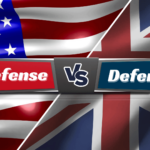Do you ever get confused about whether to use “offence” or “offense” in your writing? If so, you are not alone. These two words have the same meaning, but different spellings depending on where you are writing. In this article, we will explain the difference between “offence” and “offense”, and how to choose the right spelling for your audience.
What is the meaning of “offence” and “offense”?
Both “offence” and “offense” are nouns that can mean:
- A violation or breaking of a law, rule, or agreement
- A cause of anger, annoyance, or resentment
- A strategy or tactic used in sports or military to attack or score points
For Example:
- He was charged with a serious offence of fraud.
- She took offence at his rude remark.
- The team needs to improve its offense to win the game.
What is the difference between “offence” and “offense”?
The difference between “offence” and “offense” is not in their meaning, but in their spelling. “Offense” is the preferred spelling in American English, while “offence” is preferred in British, Indian, Canadian, and Australian English. This is one example of the differences between British English and American English.
Here is a table for better understanding:
| British English | American English |
|---|---|
| Colour | Color |
| Catalogue | Catalog |
| Centre | Center |
| Defence | Defense |
| Favourite | Favorite |
| Honour | Honor |
| Licence | License |
| Metre | Meter |
| Neighbour | Neighbor |
| Organise | Organize |
How to choose the right spelling?
The best way to choose the right spelling for your audience is to consider who you are writing for, and what style guide or dictionary they follow. For example, if you are writing for an American audience, you should use “offense” and other American spellings, and follow a style guide like the Associated Press Stylebook or the Chicago Manual of Style.
If you are writing for a British audience, you should use “offence” and other British spellings, and follow a style guide like the Oxford Style Manual or the Guardian Style Guide.
Offence vs Offense: How to Choose the Right Spelling?
In American English, use “offense,” and in British, Indian, Canadian, and Australian English, use “offence.” Consider your audience and follow the relevant style guide, such as AP Stylebook for American English or Oxford Style Manual for British English.
Examples of “offence” and “offense” in sentences
Here are some examples of how to use “offence” and “offense” in sentences, depending on the spelling variant you choose:
- American English: The judge sentenced him to five years in prison for the offense of robbery.
- British English: The judge sentenced him to five years in prison for the offence of robbery.
- American English: No offense meant, but I think you are wrong about that.
- British English: No offence meant, but I think you are wrong about that.
- American English: The quarterback led the offense to a touchdown in the final minute.
- British English: The quarterback led the offence to a touchdown in the final minute.
We use “Offence” and “Offense” as nouns. They have the same meaning, but different spellings depending on where you are writing. “Offense” is the preferred spelling in American English, while “offence” is preferred in British, Indian, Canadian, and Australian English.
Some examples of using “Offence” and “Offense” as nouns are:
- He was charged with a serious offence/offense of fraud.
- She took offence/offense at his rude remark.
- The team needs to improve its offence/offense to win the game.
Conclusion
“Offence” and “offense” are both correct spellings of the same word, but they have different usage depending on where you are writing. “Offense” is the standard spelling in American English, while “offence” is the standard spelling in British, Indian, Canadian, and Australian English.


